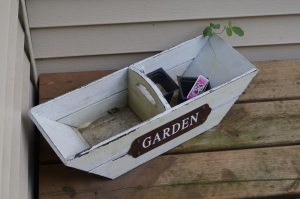Matthew 13:4-6
As he was scattering the seed, some fell along the path, and the birds came and ate it up. Some fell on rocky places, where it did not have much soil. It sprang up quickly, because the soil was shallow. But when the sun came up, the plants were scorched, and they withered because they had no root.
One spring day, I dropped the youngest grandkids off at their house. Their Mom was planting annual flowers while their Dad was planting field soybeans. The front yard was littered with black plastic annual containers. I saw lots of soybean seeds in the driveway where Darran had loaded the planter.
Six-year-old Waylan told me he was going to make money this summer. I asked him how. He showed me some annual containers, which he had filled with sandbox sand and planted soybean seeds. He planned to sell these containers and make money. “You, Dianne, are my first customer,” he told me.
Not wanting to squash his enthusiasm, I asked him, “How much?” “Two for $2,” he told me. I dug through my wallet. It was slim pickings. I only had $1. I gave him the dollar and he said I could get him the other buck later.
Not to be outdone by her older brother, Ellie quipped that she too was going make money. To prove her point, she filled a bucket with the soybean seeds, walked up the bank to the sandbox and quickly planted the seeds.
I took Waylan’s containers home, put them on an outside deck inside a decorative garden box and forgot about them. A couple weeks later, I noticed something peaking over the box’s top. It was a soybean plant! With enough rain to sprout the seed, it was about eight inches tall. I proudly showed the plant to Rick. I also knew its live was short-lived unless I replanted it, which I did not do. When I looked couple weeks later, the plant was brown.
One day, Jesus taught a large crowd near a lake. The crowd was so big that he got into a boat, pushed off from shore and let the water be a natural amplifier. He told the parable of the sower. Many in the crowd could have been farmers. They would have been familiar with needing proper soil for good plant growth. Maybe they had watched seed they planted wither up and die because it was not sowed in rich soil.
The disciples were confused why Jesus talked in parables, little stories to demonstrate a point, rather than just saying what he wanted the people to learn. Jesus reminded the disciples when people have more information and understanding, more is expected. I did not expect Waylan to understanding the soybean seeds he planted in sand would ever amount to anything. But I know better. If I wanted to see the soybean grow, I should have transferred it. When I did not do this, the plant sprouted but never had a long-term chance.
What kind of soil is your faith rooted in? Is your faith on rocky soil, where you respond to God only in dire straits? Or is your faith in shallow soil, where it sprouts quickly but is easily scorched out? Is your faith more like a blackberry thicket, which so many thorns that it easily gets choked out? Or is your faith rooted in good soil, which produces an abundant crop?
I can identify various times in my life when I have had different soil types for my faith. I need more good soil right now and am confident I will rediscover rich, black soil needed for deep seeded faith. Good soil takes time to develop. It needs a silt-loam base, natural fertilizer (i.e. – manure) and humus (i.e. – decomposed old plants. Good soil for faith needs the base of digging into God’s word, lots of knee time (prayer) and an actively lived faith (service). Without one of these factors, our faith often becomes rocky soil, sinking sand or a thorny thicket.
Thank you for being patient with us when we do not put all the effort into nurturing our faith as we should, when we do not dedicate the time and effort necessary to develop good soil for solid faith. Encourage us to take one small step this day to move away from sinking sand and rich soil faith. Amen.
Blessings –
Dianne



Comments are closed